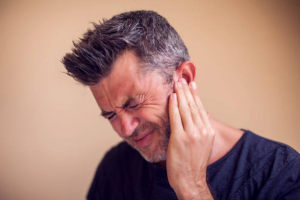Tinnitus can be different things for different people, however, in general terms it is described as a ringing, buzzing or whooshing sound you hear when there are actually no external sounds. It can affect just one or both of your ears. Unfortunately, it can be uncomfortable and ultimately can affect your day to day life. Tinnitus is most common in adults and the elderly. It is so important to monitor your hearing and act on any such ringing before it gets worse.
What does it sound like?
The most common sound tinnitus sufferers report hearing is a ringing sound. The sound you hear can take so many different forms, but the thing that will remain the same is only you can hear the sound. The pitch and frequency of any tinnitus sounds varies wildly from person to person so it is important to give an accurate description to any hearing healthcare professional you seek advice from.
What causes it?
There are a few different causes of tinnitus including underlying conditions such as ear injuries or circulatory system problems. You and your hearing healthcare professional can analyse when the tinnitus began and perhaps work out what the trigger was. Narrowing down the cause of the tinnitus will help with any treatment you have.
Constant exposure to loud noise is another cause of tinnitus; this could be from working in a noisy environment using heavy tools or constantly listening to music through earphones at a very high level. Such loud noises can damage the tiny hair cells in the cochlea which then send false impulses to the brain causing tinnitus.
Old age is another contributing factor purely because of the hearing problems that generate as we age. Even simple things, such as bad ear infections or head injuries can trigger tinnitus. You must seek help from a hearing healthcare professional once you notice any symptoms, particularly after an injury. The earlier you begin to treat tinnitus, the better.
Tinnitus seems to be more likely to affect men than women, as well as affecting avid smokers and alcoholics more.
What are the symptoms?
Due to the uncomfortableness and irritability of tinnitus, the effects can be debilitating and include fatigue, stress, difficulty concentrating and carrying out tasks, sleep problems, headaches and depression. You can talk to an audiologist about masking the symptoms with specific hearing aids. If your tinnitus is being caused by an underlying condition, then it is the condition that will need to be treated first and foremost.
Protect your ears!
You can take precautions to protect your ears against loud noises by using ear protection devices and therefore limiting the risk of you developing tinnitus. If you work in a noisy environment, for example operating heavy machinery, you should be extra careful and ensure you wear stringent ear protection. It goes without saying that when listening to music through headphones, always turn the volume down to an appropriate level.
If you believe you would benefit from a course of tinnitus therapy or are interested in trying hearing aids that are specifically designed to help with the symptoms of tinnitus, please do give us a call.



